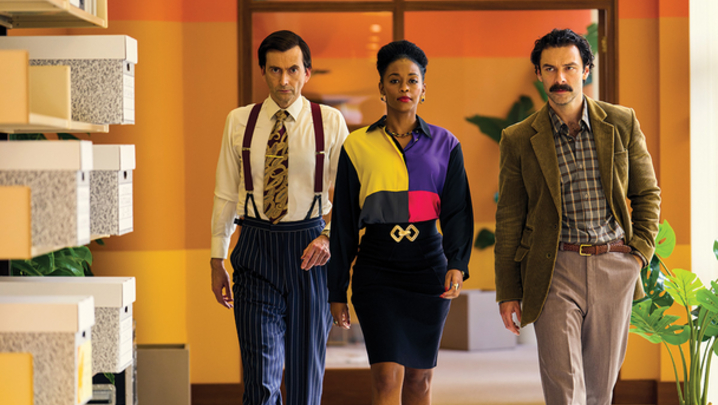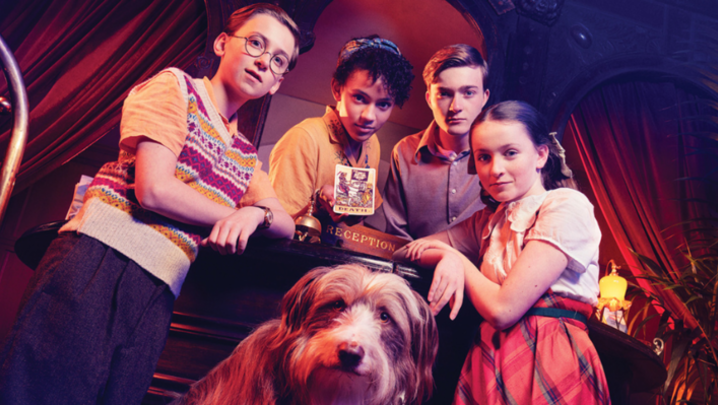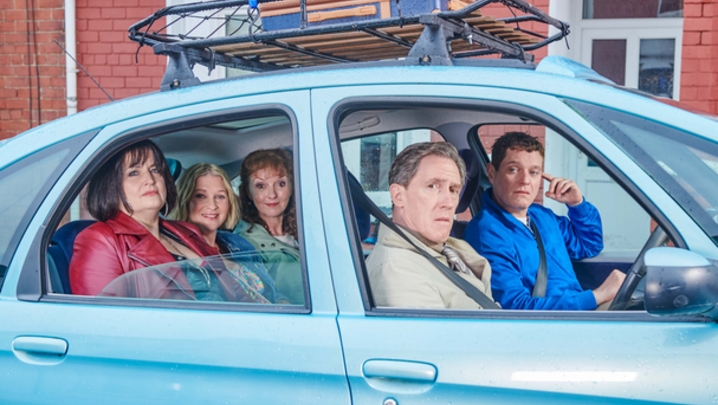Channel 4 News editor Ben de Pear tells Sanya Burgess why his reporters need to get out more
Mornings in the De Pear household are like many across the country. The family chomp down breakfast, dash around to get the three children ready for school on time and Ben and wife Leila listen with one ear to Radio 4’s Today programme on in the background.
But, during the US election, Ben de Pear, who is editor of Channel 4 News, started to turn down the radio when Donald Trump was discussed.
He now wonders whether to turn on the show in the first place: “I used to listen to Today obsessively around the house but I do find myself listening through headphones because, actually, I don’t want [my children] to hear some of the stuff that is going on.…
“We’re in a weird period [when] we are censoring the news for our children.”
De Pear does not look the stereotype of the modern editor. His shirt is rumpled, partially untucked, with a rip on his left elbow.
It is under his editorship that the show has grown to become one of the most-watched news outlets in Europe. This is thanks to the skilful translation of the hour-long bulletin into video clips broadcast on Facebook.
Their presence on the social-media platform has grown from a healthy 80 million video views in 2014 to the enviable figure of 2 billion last year.
Fakes news is probably the most dangerous thing of our time
The show’s traditional broadcast figures are still dwarfed by the millions who tune into BBC and ITV news programmes. But Barb confirms that Channel 4 News’s audience can number as much as 1 million and is frequently around 750,000 to 850,000.
Considering the show’s smaller resources and awkward time slot of 7pm – when a lot of Channel 4 News’s key demographic of upmarket males are commuting – the size of its TV audience should not be scoffed at.
Recognition from within the industry remains robust. Last year, Channel 4 News won 26 awards, including a Bafta, and secured six wins and 12 nominations for this year’s RTS Television Journalism Awards, including Young Talent of the Year and Daily News Programme of the Year.

De Pear believes the secret of this success comes from Channel 4’s remit, which he describes as “brilliant and imaginative”. His comments come as culture secretary Karen Bradley continues to chew over the future of Channel 4.
Any changes could have implications for the ITN-produced Channel 4 News.
“Why is there still a debate going on about the future of Channel 4? It’s mad,” says De Pear.
He finds the debate destabilising and, from his tone of voice, exasperating. To threaten Channel 4 News would be, he says, “an act of madness” and “sheer lunacy”.
He warns: “I feel very honoured to be the editor of this programme… which I think is among the best in the world and certainly one of the best in the English language.
“And to mess with that, you’d better know what you’re doing. Especially in this atmosphere, at this moment, when a 16-year-old kid in Macedonia can invent stories that are shared by hundreds of thousands of people and can earn hundreds of thousands of pounds for doing so.
“To destabilise or mess with the foundations of this programme and everything else that Channel 4 does, you do so at your own peril.”
De Pear finds it amusing that Channel 4 News is now referred to as the “so-called mainstream media”. He believes the label should be a badge of pride: “Fake news, as a phrase, is annoying everyone, but… I think it’s probably the most dangerous thing of our time, without doubt. Global terrorism is a terrible thing but this is certainly more insidious,” he says.
To De Pear, to be “mainstream media” is to have layers of vetting and fact-checking. He says that a vital part of this system is Ofcom: “I think that, as much as it’s a pain in the arse, it’s a wonderful system.”
Channel 4 News voluntarily holds its social-media videos to Ofcom regulations and applies the broadcaster’s remit to all content published online.
“We are quite serious, we are questioning, we are inquisitive and I think that it makes us quite shareable [online],” he explains, adding: “I think that people feel quite clever when they share our material, or it makes them feel moved or they think it makes them look good when they share our material. I think it’s been a very good strategy and it’s worked very well.”
However, one instance where the show’s pioneering online strategy backfired was its ill-advised Facebook Live footage of the battle for Mosul in October 2016.
“It was a really stupid thing for us to do,” admits De Pear. “We thought you can probably go live from almost anywhere.… But, of course, we forgot about the bloody emojis, which were hearts and happy faces and smiley faces coming out when you’ve had Isis going on. It was not good.”
Across the industry, Channel 4 News’s coverage of Aleppo has been applauded.
De Pear, a former head of foreign news at the programme, lays most of the credit at the feet of a young, local film-maker, Waad al-Kateab – the first woman to win RTS Camera Operator of the Year at the RTS Televison Journalism Awards. She recently turned 26.
After she submitted a video to the programme, she was taken out of Aleppo by the foreign editorial team, who met her in Turkey, gave her a camera and training. She then returned to her city with a determination to see the crisis out until the bitter end, working exclusively for Channel 4 News.
“Waad was not objective or impartial in the way that Lindsey Hilsum or Jonathan Rugman would be as an outsider, or someone who was coming to report objectively. But what she did was she filmed observational stuff and captured the raw horror of what was going on without editorialising,” reflects De Pear.
He continues: “The end of Aleppo was a bloody and horrible incident in history and it was disgusting to behold. [But the remit and funding model create] a delicate ecosystem, which was devised in order to support Channel 4 News and to make it unlike any other broadcaster.
“That helps us to tell the story of Aleppo better than anyone else. I wouldn’t say that about every story, but I would say that about Aleppo.”
Waad was not objective or impartial in the way that Lindsey Hilsum...would be
The other major news story of 2016 was, and for the foreseeable future is, President Trump.
“I think there was an unpleasantness and aggression and nastiness injected by Donald Trump into the election, which made his election seem unlikely,” says De Pear. “He broke the mould. He smashed the mould and threw it in people’s faces.”
The Channel 4 News editor takes umbrage at some news outlets for referring to Trump as “colourful” and insists that his campaign was “unorthodox”.
“I was very clear with [the team] that ‘unorthodox’ is not to replace racist, sexist, bigoted, rude, abusive,” he explains.
The challenge now, De Pear says, is holding Trump to account while not picking up on every single thing – coverage has to reflect how relevant the US President is to a British audience.
Media coverage of the US election was often led by what turned out to be inaccurate polling data, a trend mirrored in the UK’s 2015 general election and the EU referendum.
Of the latter, De Pear concludes: “We make a big effort to report from all over Britain, but I think we believed the polls when we should have believed our gut.
“There were reporters in this newsroom who said: ‘We’re going to vote out and we [the UK] are going to leave’, [but] we felt that we couldn’t go against the polling.”
As a result, Channel 4 News is pursuing plans to make its newsroom less London-centric.
De Pear says: “News covers places where big things happen and I think that, with Brexit and Trump, we were not covering places where things weren’t happening. Things in economically deprived places were where things weren’t happening and weren’t ‘newsworthy’.”
De Pear has no desire to leave his position any time soon. But, even if he can survive a news agenda tainted by fake news, Brexit and Trump, he does not intend to stay as long as his predecessor, Jim Gray. His editorship lasted 14 years.
And what about that national treasure, Channel 4’s main presenter, Jon Snow? “No idea. [His retirement] is so far away that, I think, by the time it happens, we may all be living in colonies on Mars or on different planets. It is beyond the horizon.”







